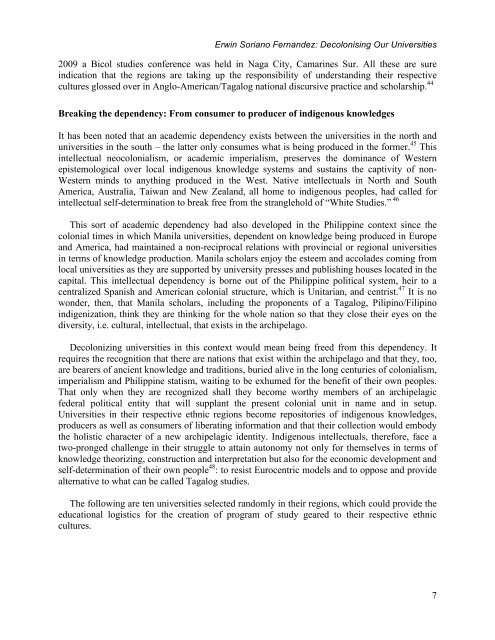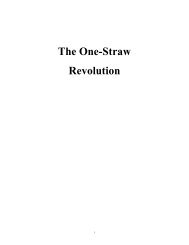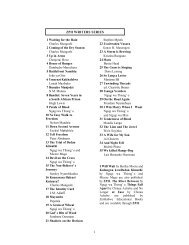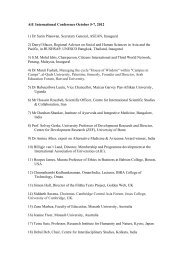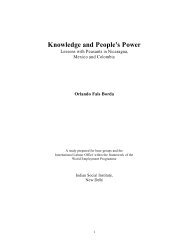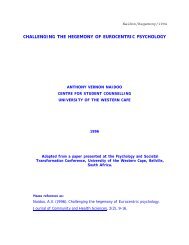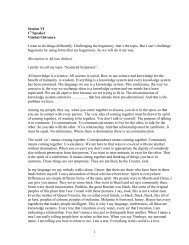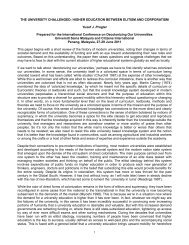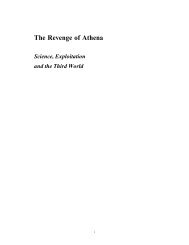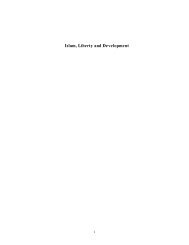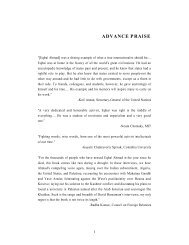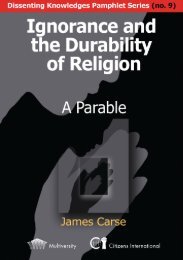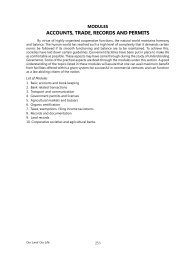1 INTELLECTUAL NEOCOLONIALISM IN THE ... - Multiworld India
1 INTELLECTUAL NEOCOLONIALISM IN THE ... - Multiworld India
1 INTELLECTUAL NEOCOLONIALISM IN THE ... - Multiworld India
Create successful ePaper yourself
Turn your PDF publications into a flip-book with our unique Google optimized e-Paper software.
Erwin Soriano Fernandez: Decolonising Our Universities<br />
2009 a Bicol studies conference was held in Naga City, Camarines Sur. All these are sure<br />
indication that the regions are taking up the responsibility of understanding their respective<br />
cultures glossed over in Anglo-American/Tagalog national discursive practice and scholarship. 44<br />
Breaking the dependency: From consumer to producer of indigenous knowledges<br />
It has been noted that an academic dependency exists between the universities in the north and<br />
universities in the south – the latter only consumes what is being produced in the former. 45 This<br />
intellectual neocolonialism, or academic imperialism, preserves the dominance of Western<br />
epistemological over local indigenous knowledge systems and sustains the captivity of non-<br />
Western minds to anything produced in the West. Native intellectuals in North and South<br />
America, Australia, Taiwan and New Zealand, all home to indigenous peoples, had called for<br />
intellectual self-determination to break free from the stranglehold of “White Studies.” 46<br />
This sort of academic dependency had also developed in the Philippine context since the<br />
colonial times in which Manila universities, dependent on knowledge being produced in Europe<br />
and America, had maintained a non-reciprocal relations with provincial or regional universities<br />
in terms of knowledge production. Manila scholars enjoy the esteem and accolades coming from<br />
local universities as they are supported by university presses and publishing houses located in the<br />
capital. This intellectual dependency is borne out of the Philippine political system, heir to a<br />
centralized Spanish and American colonial structure, which is Unitarian, and centrist. 47 It is no<br />
wonder, then, that Manila scholars, including the proponents of a Tagalog, Pilipino/Filipino<br />
indigenization, think they are thinking for the whole nation so that they close their eyes on the<br />
diversity, i.e. cultural, intellectual, that exists in the archipelago.<br />
Decolonizing universities in this context would mean being freed from this dependency. It<br />
requires the recognition that there are nations that exist within the archipelago and that they, too,<br />
are bearers of ancient knowledge and traditions, buried alive in the long centuries of colonialism,<br />
imperialism and Philippine statism, waiting to be exhumed for the benefit of their own peoples.<br />
That only when they are recognized shall they become worthy members of an archipelagic<br />
federal political entity that will supplant the present colonial unit in name and in setup.<br />
Universities in their respective ethnic regions become repositories of indigenous knowledges,<br />
producers as well as consumers of liberating information and that their collection would embody<br />
the holistic character of a new archipelagic identity. Indigenous intellectuals, therefore, face a<br />
two-pronged challenge in their struggle to attain autonomy not only for themselves in terms of<br />
knowledge theorizing, construction and interpretation but also for the economic development and<br />
self-determination of their own people 48 : to resist Eurocentric models and to oppose and provide<br />
alternative to what can be called Tagalog studies.<br />
The following are ten universities selected randomly in their regions, which could provide the<br />
educational logistics for the creation of program of study geared to their respective ethnic<br />
cultures.<br />
7


